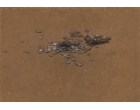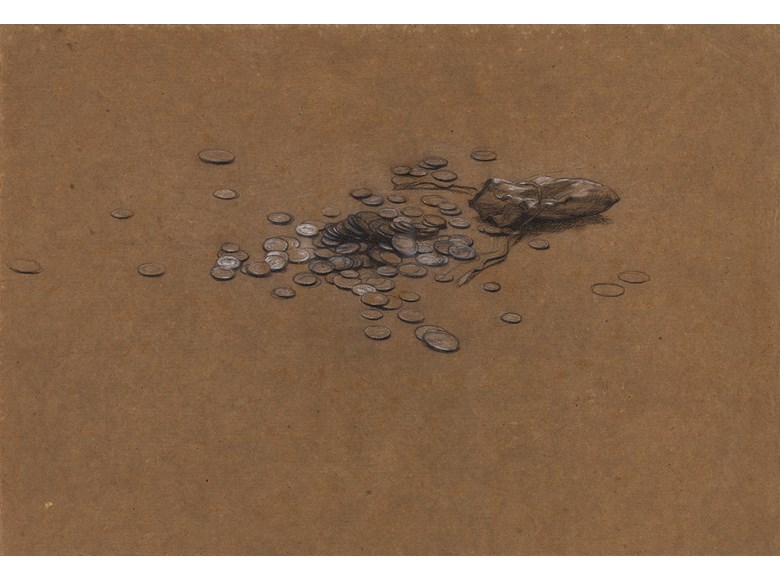 BACK TO GALLERY
BACK TO GALLERY
Lowell Libson & Jonny Yarker Ltd
Sir Edward John Poynter
Gold coins: A Study for 'The Cave of the Storm Nymphs'
Signed with monogram bottom right: ‘EJP’
9 ½ x 14 ⅛ inches; 240 x 360 mm
description
This characteristic study was made by Edward Poynter in preparation for the second, larger version of his most famous composition, The Cave of the Storm Nymphs, which he showed at the Royal Academy in 1903. Poynter had shown a first version of the painting in 1902, now in the collection of the Hermitage Museum and Gardens, Norfolk, Virginia, before making a second version, incorporating a number of compositional changes, which he showed the following year. One of the most significant additions was a purse spilling gold coins, which Poynter added to the sand between the two reclining nymphs in the foreground. The present beautifully drawn sheet is the study for this addition.
By 1902 Poynter was the most celebrated figure in the British art world, serving simultaneously as Director of the National Gallery and President of the Royal Academy. The success of the small version of The Cave of the Storm Nymphs prompted Poynter to complete a second, larger version. Poynter kept the composition largely the same, simply amplifying certain narrative details, principally the quantity and variety of the treasure strewn cave. The addition of an upturned jewel box in the foreground of the composition and the purse and scattered coins in on the sand between the two central nymphs were the most substantive. Poynter was a meticulous draughtsman who worked up every detail of his composition in advance. Indeed, he went so far as to publish a visual essay of sketches related to Storm Nymphs in Nash’s Pall Mall Magazine. Poynter even exhibited the drawings at the Fine Art Society in 1903 and a number of studies were included in publication The Drawings of Sir E. J. Poynter, published in 1905. This book demonstrated the attention Poynter lavished on preparing his exhibited works, it included several meticulous studies of the cliffs at Tintangel, which formed the backdrop of The Cave of the Storm Nymphs. The present drawing is a characteristic example of Poynter’s scrupulous observation and subtle handling of black and white chalks on buff paper, made for Poynter’s most celebrated painting.
By 1902 Poynter was the most celebrated figure in the British art world, serving simultaneously as Director of the National Gallery and President of the Royal Academy. The success of the small version of The Cave of the Storm Nymphs prompted Poynter to complete a second, larger version. Poynter kept the composition largely the same, simply amplifying certain narrative details, principally the quantity and variety of the treasure strewn cave. The addition of an upturned jewel box in the foreground of the composition and the purse and scattered coins in on the sand between the two central nymphs were the most substantive. Poynter was a meticulous draughtsman who worked up every detail of his composition in advance. Indeed, he went so far as to publish a visual essay of sketches related to Storm Nymphs in Nash’s Pall Mall Magazine. Poynter even exhibited the drawings at the Fine Art Society in 1903 and a number of studies were included in publication The Drawings of Sir E. J. Poynter, published in 1905. This book demonstrated the attention Poynter lavished on preparing his exhibited works, it included several meticulous studies of the cliffs at Tintangel, which formed the backdrop of The Cave of the Storm Nymphs. The present drawing is a characteristic example of Poynter’s scrupulous observation and subtle handling of black and white chalks on buff paper, made for Poynter’s most celebrated painting.






 SEND AN EMAIL
SEND AN EMAIL